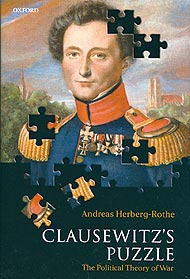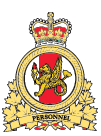 This information has been archived for reference or research purposes.
This information has been archived for reference or research purposes.
Archived Content
Information identified as archived on the Web is for reference, research or recordkeeping purposes. It has not been altered or updated after the date of archiving. Web pages that are archived on the Web are not subject to the Government of Canada Web Standards. As per the Communications Policy of the Government of Canada, you can request alternate formats on the "Contact Us" page.
Book Reviews
Clausewitz’s Puzzle: The Political Theory Of War
by Andreas Herberg-Rothe
Oxford, United Kingdom: Oxford University Press, 2007
208 pages (hardcover), £40.00
ISBN-13: 978-0-19-920269-0
Reviewed by Bill Bentley
For more information on accessing this file, please visit our help page.
 In recent years, two prominent scholars, one a historian, the other a political scientist, have questioned the value of Carl von Clausewitz’s work, especially his theory of war as contained in his most famous work On War (1831) in the context of today’s conflict scenarios. This has generated considerable debate, since these attacks come during a period of resurgence in the study of Clausewitz – a resurgence that began with the 1976 publication of Michael Howard and Peter Paret’s translation into English of On War. It gained momentum with the US defeat in Vietnam and their search for some explanation for it in Clausewitz. Many current scholars and practitioners still feel that Clausewitz’s theory may be especially helpful in dealing with the complex, non-linear, highly politicized conflicts of the early 21st Century.
In recent years, two prominent scholars, one a historian, the other a political scientist, have questioned the value of Carl von Clausewitz’s work, especially his theory of war as contained in his most famous work On War (1831) in the context of today’s conflict scenarios. This has generated considerable debate, since these attacks come during a period of resurgence in the study of Clausewitz – a resurgence that began with the 1976 publication of Michael Howard and Peter Paret’s translation into English of On War. It gained momentum with the US defeat in Vietnam and their search for some explanation for it in Clausewitz. Many current scholars and practitioners still feel that Clausewitz’s theory may be especially helpful in dealing with the complex, non-linear, highly politicized conflicts of the early 21st Century.
The historian John Keegan has argued that Clausewitz is not only not relevant, but that his theory is actually dangerous, because he has misconstrued completely the nature and causes of war. For Keegan, war is not, as Clausewitz stated, “merely the continuation of policy with the admixture of other means,” but is, in fact, a cultural phenomenon that pre-dates the modern state system. According to Keegan, politics must remain, but war must be abolished. Theoretically, this can be possible if war is addressed through cultural lenses.
Martin Van Creveld attacks from a different direction, arguing that war may well have been policy pursued by nation states, but the 21st Century is witnessing the decline of the state. Therefore, Clausewitz’s Trinitarian definition of war as a combination of the people, the armed forces, and the government is no longer valid or relevant.
In large measure, Andreas Herberg-Rothe’s book is a repudiation of these two positions, and hence the sub-title, The Political Theory of War. In a tightly and densely argued manner, he largely succeeds in maintaining Clausewitz’s relevance, even in this era of both intra- and inter-state conflict.
To be sure, this is not a book for the beginner. Those who have not read Clausewitz carefully and thoughtfully (perhaps even twice) would do well to access his ideas first through other means. Neophytes could start with Beatrice Heuser’s Reading Clausewitz or Hugh Smith’s On Clausewitz: Political and Military Ideas. For those who have a strong interest in and a deep understanding of Clausewitz’s theory, however, this book is stimulating, thought-provoking, and valuable.
Clausewitz served in the Prussian army (and for a brief period with the Russians) throughout the Napoleonic Wars. He participated in or studied many battles and campaigns of the day. Taken together, Clausewitz’s military experiences from 1792 to 1815, augmented by a thorough study of military history, generated what the British philosopher W.B. Gallie calls the first, and to that point (1991), the only book of outstanding intellectual eminence on the subject of war.
Herberg-Rothe frames his work around three paradigmatic military campaigns that he believes help penetrate to the core of Clausewitz’s thinking about war. He first distinguishes between early and later periods of Clausewitz’s intellectual development and describes four fundamental contrasts that are explained by the lessons the Prussian drew from the battles of Jena (1806), the Russian campaign (1812), and Waterloo (1815).
The four contrasts are: the primacy of military force versus the primacy of policy; existential warfare versus the instrumental view of war; the principle of destruction versus the primacy of limited war; and, the promise of decisive victory as part of the offence versus defence as the stronger form of war.
According to Herberg-Rothe, Jena, the battle that destroyed the Prussian army and almost collapsed the Prussian state, convinced Clausewitz that the first half of each contrast had to be accounted for in his theory of war; whereas the Russian campaign and Waterloo convinced him that the second half of each contrast must be given equal status. The problem for Clausewitz was to resolve or reconcile all these issues into a unitary theory of war. He achieved this through the use of dialectical thinking and the sustainment of the dynamic tension among all pairs of contrasts by the supremacy of reason, in the abstract, or by policy, in the real world. The result was a theory that postulated two kinds of war, unlimited and limited, each infused with the attributes of war in the abstract, or “Absolute War.”
The author of Clausewitz’s Puzzle does a good job of situating the Prussian military theorist in the intellectual context of his time. He maintains that the most important influences on Clausewitz were the rationalist currents of the Enlightenment, Idealism, Romanticism, and the findings of the natural sciences. One can say, according to Herberg-Rothe, that Clausewitz floats within the field formed by these four currents of thought. Each provided him with stimulation, but his own position cannot be traced to any single one of them.
This is where I would part company with the author. It seems more likely that Clausewitz was profoundly influenced by the way in which Romanticism, and especially German Romanticism, interpreted the legacy of the Enlightenment, the idealism of Kant, Schelling, and Fichte, and the nature of science. According to Dietrich von Engelhardt in Romanticism in Germany, German Romanticism is universal, encyclopaedic in a specific sense, combining totality and individualism, empiricism and metaphysics, history, and the present. Clausewitz knew many leading Romantics well, particularly Auguste Schlegel and Georg Hegel. But the Romanticism inherent in Clausewitz’s work is not due to personal contacts, but is rather textual and profoundly philosophical.
Central to Romantic philosophy were three components – an organic rather than a mechanistic conception of reality and nature, known at the time as naturphilosophie; the epistemological theme concerning the irresolvable tension between subject and object, mind and the world, between men and nature; and, the Romantic idealist ontology that conceived of reality as the identity of the Absolute and the Particular.
The first component is explicitly apparent throughout On War. As distinct from other contemporary military theorists, Clausewitz sees war as an organic – not inorganic or mechanical – activity. The second is the basis for Clausewitz’s philosophic method of analysis – the dialectic; the third is the most probable explanation for Clausewitz’s distinction between “Absolute War” and “Real War.”
In German Romantic philosophy and science (Schlegel, Hegel, Schelling, Goethe) the Concept, Begriff, Urphanomen or Urpflanze were all terms used to describe the ideal Absolute. The Concept is the genuine first, and things are what they are through the action of the Concept immanent in them and revealing itself in them.
Put another way, a Particular thing (Real-World War) is first in order of existence since to know that a thing exists we must know something about particular or determinate things. This is because, if it exists, a Universal exists only in Particulars. A Universal (Absolute War), however, is first in order of explanation because to know what a thing is, we must be able to specify some properties of it, some features it shares in common with other things.
These and many other Romantic themes – for example, historicism – run throughout Clausewitz’s theory. Herberg-Rothe clearly has not looked at Clausewitz’s puzzle through the prism of Romanticism, or he has implicitly rejected this approach. In either case, his own analysis remains penetrating, and renders Clausewitz as relevant, if not even more so in today’s security environment, including terrorism, asymmetric war, and the so-called Fourth Generation Warfare, than he ever was relevant.
Clausewitz’s Puzzle will undoubtedly generate more healthy debate throughout military and security communities. It would also make an excellent text at War Colleges and post-graduate courses in international relations, security studies, military history, even philosophy.
![]()
Lieutenant-Colonel (ret’d) L. William Bentley, MSM, CD, PhD, is Head of the Leadership Theory Section of the Canadian Forces Leadership Institute in the Canadian Defence Academy.






